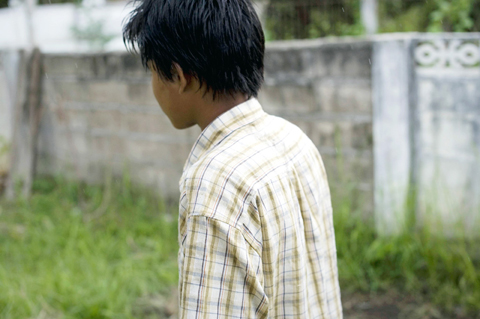The spiky-haired teenager said he clearly recalls the day when Myanmar state troops whisked him from the streets of Mandalay, accused him of stealing and forced him to become a child soldier.
“They said if you don’t want to go to jail, you must join the army. I said I didn’t want to join, but whenever I said it they beat me again and again. When I agreed to join they stopped beating me,” Win Sein said.

PHOTO: AFP
He said he was homeless and aged about 15 — although he doesn’t know his birthday — when he was recruited less than two years ago, joining thousands of under-18s believed to be in Myanmar’s state army and ethnic armed groups.
After four months of boot camp, involving a grueling fitness regime, weapons training and corporal punishment, the youngster said he was sent to the frontline of civil war against ethnic rebels in remote jungle regions.
A year later, Win Sein fled his post and eventually escaped from the country, arriving in the Thai border town Mae Sot in March.
“The main reason was not the fighting, but because the sergeants were really, really brutal. They always insulted and beat the child soldiers,” he said.
“So I decided to run away, whatever happened to me,” he said.
While it is difficult to verify former child soldiers’ backgrounds, Myanmar analyst David Mathieson of Human Rights Watch said Win Sein’s story was “sadly typical, in terms of training times, locations and the workload.”
Win Sein, whose name has been changed for this article to protect him and his family, is now in the care of Mae Sot-based aid group Social Action for Women (SAW), where he was initially reluctant to discuss his harrowing experience.
“After he arrived, he would lose control. He broke bottles and used the glass to cut his arm,” SAW’s director Aye Aye Mar said. “He didn’t talk. He didn’t answer any questions we asked. He didn’t trust anyone.”
Such psychological damage is typical in youngsters who have spent time in the army, said the director, who has looked after around 20 former child soldiers from Myanmar.
Win Sein said the children at his boot camp were forced to tell the lieutenant they had signed up voluntarily, and “because they were afraid of the sergeants who recruited them, they lied about their age.”
Such underage enlistment, which is banned by law in Myanmar, is a result of regimental efforts to keep numbers up in the vast army rather than a central junta directive, Mathieson said.
“It’s basically free market recruitment,” he said. “It’s certainly not official — there’s no paper trail saying it’s coming from the war office in [the capital city] Naypyidaw.”
Mathieson said there are likely to be thousands of child soldiers in the state military, which is thought to be up to 400,000 strong.
And the problem is not confined to the official force in Myanmar, a nation ruled by the military since 1962 and embroiled in civil war in ethnic minority areas since gaining independence in 1948.
A UN report released in May named nine of the country’s ethnic armed groups, as well as the government army, for recruiting and using children in conflict, noting “extremely limited access” to monitor such forces.
Win Sein, who before his recruitment had run away from home to escape abuse by his stepfather, said street children were a particularly easy target for state troops who get paid or rewarded for filling military personnel quotas.
He said he met numerous fellow child soldiers with a similarly penurious background to his own.
“Soldiers dressed in plain clothes go to children who live on the street and say, ‘Hey little brother, do you want a snack? I will get you one.’ These street children are hungry and have no food, so they are happy someone is buying something for them and they follow the men,” Win Sein said.
Steve Marshall, the International Labor Organization (ILO) liaison officer in Myanmar, agreed the children preyed upon “tend to be those in a vulnerable situation,” such as boys on their own at railway stations and markets.
He said the youngest boy known to be signed up was aged just 11.
With the junta’s agreement, the ILO has a process for families to complain about underage recruitment cases, which if verified are submitted to the government to get the children released and their recruiters disciplined.
Since 2007, more than 100 victims have been discharged and numerous army personnel reprimanded for their part in such cases, including three who were jailed, and there has been training by the military to raise awareness of recruitment law.
But “there is no firm evidence suggesting that the situation has markedly improved,” Marshall said.
The youngsters roped into battle can face destroyed childhoods, uncertain futures and — for deserters such as Win Sein — a lingering fear of retribution.
“I would like to see my mother and sister again, but I dare not contact them because I don’t want to get them in trouble,” he said. “I also don’t want them to know what I have been through.”

STEPPING UP: Diminished US polar science presence mean opportunities for the UK and other countries, although China or Russia might also fill that gap, a researcher said The UK’s flagship polar research vessel is to head to Antarctica next week to help advance dozens of climate change-linked science projects, as Western nations spearhead studies there while the US withdraws. The RRS Sir David Attenborough, a state-of-the-art ship named after the renowned British naturalist, would aid research on everything from “hunting underwater tsunamis” to tracking glacier melt and whale populations. Operated by the British Antarctic Survey (BAS), the country’s polar research institute, the 15,000-tonne icebreaker — boasting a helipad, and various laboratories and gadgetry — is pivotal to the UK’s efforts to assess climate change’s impact there. “The saying goes

Police in China detained dozens of pastors of one of its largest underground churches over the weekend, a church spokesperson and relatives said, in the biggest crackdown on Christians since 2018. The detentions, which come amid renewed China-US tensions after Beijing dramatically expanded rare earth export controls last week, drew condemnation from US Secretary of State Marco Rubio, who on Sunday called for the immediate release of the pastors. Pastor Jin Mingri (金明日), founder of Zion Church, an unofficial “house church” not sanctioned by the Chinese government, was detained at his home in the southern city of Beihai on Friday evening, said

TICKING CLOCK: A path to a budget agreement was still possible, the president’s office said, as a debate on reversing an increase of the pension age carries on French President Emmanuel Macron yesterday was racing to find a new prime minister within a two-day deadline after the resignation of outgoing French Prime Minister Sebastien Lecornu tipped the country deeper into political crisis. The presidency late on Wednesday said that Macron would name a new prime minister within 48 hours, indicating that the appointment would come by this evening at the latest. Lecornu told French television in an interview that he expected a new prime minister to be named — rather than early legislative elections or Macron’s resignation — to resolve the crisis. The developments were the latest twists in three tumultuous

FIRST STAGE: Hamas has agreed to release 48 Israeli hostages in exchange for 250 ‘national security prisoners’ as well as 1,700 Gazans, but has resisted calls to disarm Israel plans to destroy what remains of Hamas’ network of tunnels under Gaza, working with US approval after its hostages are freed, it said yesterday. Israeli Minister of Defense Israel Katz said that the operation would be conducted under an “international mechanism” led by the US. “Israel’s great challenge after the hostage release phase will be the destruction of all Hamas terrorist tunnels in Gaza,” Katz said. “I have ordered the army to prepare to carry out this mission,” he added. Hamas operates a network of tunnels under Gaza, allowing its fighters to operate out of sight of Israeli reconnaissance. Some have passed under